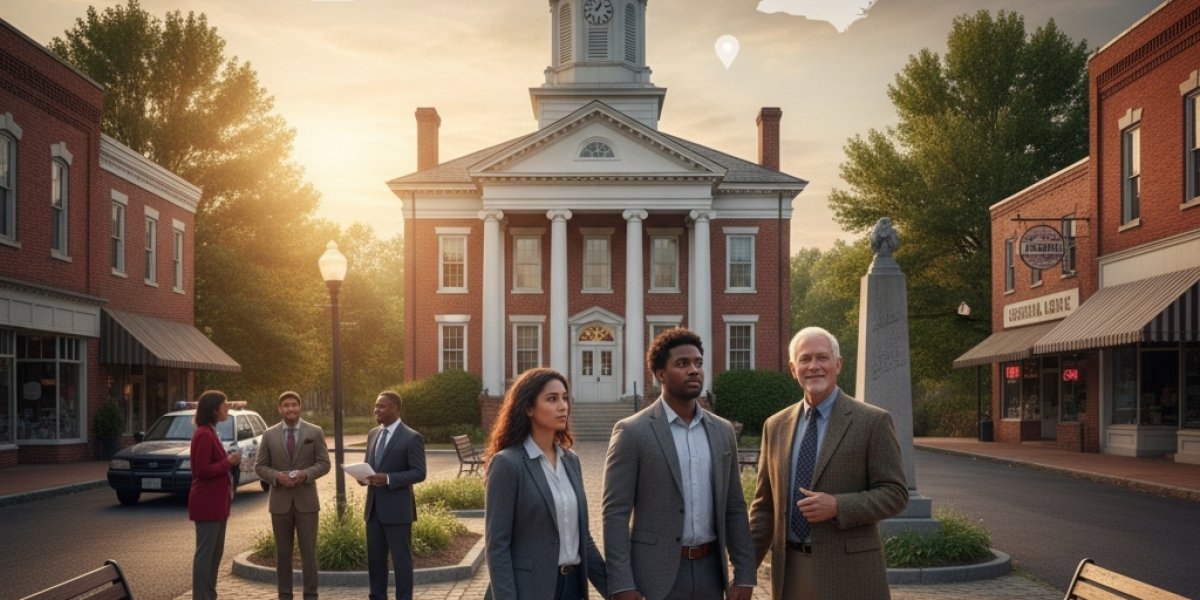Living in a small North Carolina town can feel like a close-knit community where everyone knows each other. This sense of familiarity can be comforting. However, it can make navigating the local legal system more intimidating if you ever find yourself in need of legal help. Whether it’s a minor traffic violation, a civil dispute, or a more serious criminal matter, understanding the process in small towns can help reduce stress and confusion.
The legal system in smaller towns often operates differently from larger cities like Raleigh or Charlotte. For instance, if you ever need fast assistance, services like 24/7 bail bonds Raleigh NC are available, though your experience in a small town may vary due to limited resources and staff.
How Local Courts Operate
Small-town courts in North Carolina tend to be more personal. Judges and clerks are often familiar faces in the community. This can be helpful, but it may also make the process feel more intimidating if the matter is sensitive. Courtrooms may be smaller, and staff may juggle multiple responsibilities, which can result in longer waiting times for scheduling hearings or processing paperwork.
Cases in small towns usually follow the standard North Carolina legal procedure, but there can be subtle differences in how rules are enforced. For example, traffic tickets or minor misdemeanors might be handled more informally, while serious criminal or civil cases follow strict procedures. It is wise to familiarize yourself with local rules and expectations to avoid surprises.
Filing Legal Documents
When filing legal documents, simplicity and accuracy are key. Courts often have forms available, but clerks may not provide legal advice. Mistakes on paperwork can delay your case. Many small-town residents choose to consult with a local attorney who understands the specific practices of the area.
Court Appearances
Court appearances in smaller towns often require less waiting in crowded lobbies, but punctuality is still important. Judges may expect individuals to show respect for the community setting. In some cases, mediations or informal discussions can take place before a formal hearing. Being prepared and knowing what to expect can make this process smoother.
Working With Local Law Enforcement
Interacting with police officers in small towns is often more personal. Officers usually know the residents and may handle minor infractions with warnings rather than immediate arrests. However, serious offenses are treated with the same level of seriousness as in larger cities. Understanding local law enforcement policies can help you respond appropriately if you are involved in any legal matter.
If you are arrested, bail procedures may differ. Smaller towns may rely on nearby larger facilities for holding detainees. Having access to services like bail bonds can be vital. This is where professional services can provide guidance and help you navigate the process effectively.
The Role of Attorneys and Legal Aid
Finding a local attorney familiar with the town’s legal system is highly recommended. Small-town lawyers often handle multiple types of cases, from family law to criminal defense, which allows them to provide personalized support. Legal aid organizations may also offer assistance to residents with limited resources, though availability can vary depending on the county.
Hiring an attorney early can prevent costly mistakes and ensure you understand each step of the process. Your lawyer can help you:
Review charges or claims
Prepare and file documents correctly
Represent you during hearings
Negotiate settlements or plea deals
Managing Court Costs and Fees
Legal processes come with various fees, from filing costs to fines. In small towns, these fees may be lower than in large cities, but they are still significant for many residents. Being aware of potential costs in advance can help you plan and avoid delays. Some courts offer payment plans or alternative arrangements for those who qualify.
Tips for Navigating the System
Navigating a small-town legal system may feel overwhelming at first, but a few strategies can make the experience easier:
Stay organized: Keep all documents, receipts, and correspondence in one place.
Be respectful and patient: Courthouse staff often appreciate courtesy, which can help when seeking assistance.
Know local resources: Local bar associations, legal aid offices, and bail bond services can provide support.
Ask questions carefully: While clerks cannot give legal advice, they can clarify procedural steps.
Attend every hearing: Missing a court date can complicate matters.
Understanding the local nuances of small-town courts can help reduce anxiety and improve your chances of a favorable outcome.
Differences Between Small Towns and Larger Cities
One noticeable difference between small towns and larger cities is the pace and scale of the legal process. In a city, cases often move faster due to more staff and resources. In small towns, delays may occur because the court handles a broad range of matters with limited personnel. At the same time, small-town judges may have more personal knowledge of the community, which can influence case handling.
Another difference is the community impact. Legal issues in smaller towns can feel more public because of the close-knit environment. Maintaining privacy and discretion is more challenging but essential.
Common Challenges Residents Face
Residents of small towns often face unique challenges when dealing with the legal system, such as:
Limited access to specialized attorneys
Longer wait times for hearings or document processing
Fewer support services for victims or defendants
The pressure of community scrutiny
Being aware of these challenges allows individuals to prepare and take proactive steps to protect their interests.
Conclusion
Navigating the legal system in small North Carolina towns requires patience, preparation, and awareness of local practices. While the process can feel intimidating, understanding what to expect can help you move through it more confidently. From court appearances to working with local attorneys, each step has its nuances. For those needing assistance, services like bail bondsman Brunswick County provide guidance and support during challenging times. With the right preparation, navigating the legal system in a small town can be less daunting than it first appears.
Frequently Asked Questions
Q: Do small towns in North Carolina have public defenders?
Yes, public defenders are available, but availability may vary by county. Some towns rely on nearby larger counties for legal representation services.
Q: How long does it take for a case to go to trial in a small town?
The timeline depends on the type of case. Minor cases may be resolved in weeks, while complex criminal or civil matters could take months.
Q: Can I represent myself in small-town courts?
Yes, self-representation is allowed, but it is generally not recommended. Local attorneys understand the procedures and can provide important guidance.
Q: Are bail amounts different in small towns compared to cities?
Bail amounts are set according to state law, but small-town judges may consider local factors, including the defendant’s ties to the community.
Q: Where can I find legal aid in small North Carolina towns?
Legal aid offices, local bar associations, and online resources provide assistance. Some towns have limited services, so contacting nearby counties may help.







